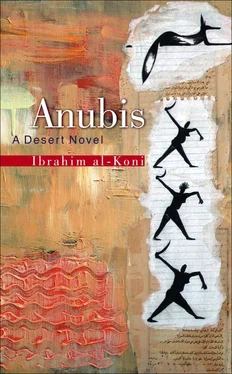“I don’t believe that.”
“He slaughtered her like a ewe on the tomb of the ancestors.”
“Shut up.”
“It’s said this wily strategist sought her life as the price of your deliverance from the reign of metamorphoses.”
“I asked him to tell me about my release. He said he freed me with the ancients’ charms, with those only the shrewdest magicians know.”
“They say that when she lay down to be slaughtered, she declared: ‘It’s not important whether I die. What’s important is for him to live. I didn’t come into the world to stay here. I came into the world so he could be.’”
We fell silent. Dusk changed into nightfall, indeed into the dark of night, but my eye could still see the treasure and the invisible universe in her eyes, just as I had seen it in the eyes of the gazelle that day.
She said, “That’s not all.” She closed her eyes. Her finger continued to poke around in her mouth but did not prevent her from saying, “Your father!”
She fell silent, and I could not bear it. I asked, “What do you want to say about my father?”
She replied coldly, “He followed you home after you departed.”
“That’s a lie.”
“I know no one will ever tell you the truth. My grandmother says that we have to learn to read people’s eyes, if we want to know anything.”
“Why did the priest conceal the truth from me?”
“Because the priest is a member of the tribe, and the tribe does not want us to trail after our fathers, because that’s a violation of the teachings of the ancient law.”
“The lost law?”
“The law that everyone refers to as lost, even though its presence among us is more powerful than that of breathing.”
“Who taught you this?”
“I know this because I’ve learned to listen. Learn to listen if you want to know things.”
“I think I’ve also heard that the law is hostile toward fathers and anyone wishing to affiliate himself with the race of fathers.”
“In the customary practice of the law, fathers have no legal standing.”
“But what’s the secret behind the law’s hostility toward fathers?”
“For us to learn the true reason for this hostility, we must live a long time and listen a long time.”
I was trembling. My body had begun to burn with emotion, fever, and misery. I asked, “But why didn’t he wait for me?”
“He didn’t leave until he had given up all hope.”
“How did the law-abiding folk treat his arrival?”
“They thought it ill-omened.”
“Ill-omened?”
“The truth is that their prophecy was soon fulfilled, because a curse fell on your dwelling the moment he left.”
“What curse?”
“Is there a curse more dreadful than for the tent post to collapse and for the home to be destroyed? Is there a fouler curse than for the mistress of the home to fall? Is there any curse more evil than for the family’s son to be transformed into a creature with a monster’s body?”
Silence sank deep roots, and the dark of night did as well. Her distant eyes were now veiled from me, and my mind soared far away. I obstinately focused on the foyers of my first birth. I scrutinized them but gained nothing more from this trip than a vision. I gained nothing beyond that figure who had appeared to me one day, squatting beside the tent post and conversing with my mother about the riddle, back when I spoke the prophecy.
Without meaning to, I said, “I saw him one day. I saw my father once. How can I see him again?”
I heard her voice in the dark but did not see her eyes. I could not see the truth. It seemed to me I was hearing the voice of the priestess: “We only see our fathers once. A father must show us his face once, so we can lose him for good thereafter.”
“I saw him like an apparition beside the tent post. He seemed to be one of the prophets.”
“All fathers are prophets.”
“Since then, he’s remained hidden.”
“Our fathers vanish, because they are prophets.”
I implored the priestess of the darkness, without realizing what I was saying: “I want to see him. How can I see him? Can’t the priest summon him for me?”
In the darkness, prophecy issued from the tongue of the priestess, “The priest can summon your father’s shadow, but he will never be able to produce your father for you.”
I was convulsed by anxiety. I trembled and fell backwards. Overhead I saw the stars.
THOSE VIPERS KNOWN as women bit me early in life: an émigrée visitor to the villages bit me on the hand. The tribe, for some reason I never knew, called her Tamnukalt, or “Princess,” and treated her with respect and pomp. She was rather haughty with an imperious bearing, a full body, a white complexion, and a beautiful face. Her eyes had an expression I understood only with hindsight; as that fang the tribe’s sages call “lust.” As I later realized, she was able to infect me with it, because I did not know its name. She moved from tent to tent with the grandeur befitting a woman of her wealth, beauty, and mystery. She would visit with the women, who treated her to banquets of meat and to singing parties, which would occasionally last until dawn. Several times I accompanied my mother to these parties, where I played with friendly girls, who liked to take me off into the corners of the tents. There I would hide with them and fall asleep before the evening’s entertainment began. My Ma would search for me to no avail and, when she despaired of finding me, return home alone. I would rejoin her only the next morning.
At one of these parties, the émigrée pinched me secretly on my buttocks. The first time, I doubted whether she had actually done it, but the act was repeated several times. I was astonished and then repulsed, but she leaned over my face until her braids buried it. As the scent of her body assailed my nostrils, I began to feel dizzy. I closed my eyes and found that she was putting a handful of dates on my lap. Then she brought her face so close to me that I felt her breath caressing my neck. Her lips touched the flesh of my right ear as she whispered in a sibilant voice, “If you visit me, I’ll give you a lot more. If you visit me, I’ll fill your arms with fresh dates dripping with honey.”
That night I did not find dry dates in my lap; I found truly fresh dates. I found the most delicious fresh dates of the oases, and honey actually oozed from them, as if a generous hand had plucked them from the palm trees of distant oases and fled with them to the desert with the speed of the jinn. The fruit’s delightfulness did not rest in its sweet juiciness, its tremulous mass, or its succulence, but in its taste, which I would never forget. It was a mythic taste that shook and provoked me, awakening in me forgotten moments I had not experienced in this lifetime. The taste made me sense that this birth was not my first, that I had been born a thousand years, indeed a million years, before. The suppressed memory awakened by the wondrous taste of that amazing fruit did not hail just from ancient times but harked back to ages that could not be reckoned in years and for which the concept of time itself was meaningless, to that secret entity wise men call “eternity.” Could it be what these sages term “immortality”? Was the taste concealed in the fruit a magic potion created as an antidote to the fearful disease people term “forgetfulness”? Against this malady even the elixirs of the magicians have been powerless.
Does this not imply that I am a creature without end or beginning, enjoying in this respect the same status as the desert, so that my death is merely a disappearance, an inevitable consequence of being asleep, and my life is simply an appearance, an inevitable consequence of being awake?
Читать дальше












